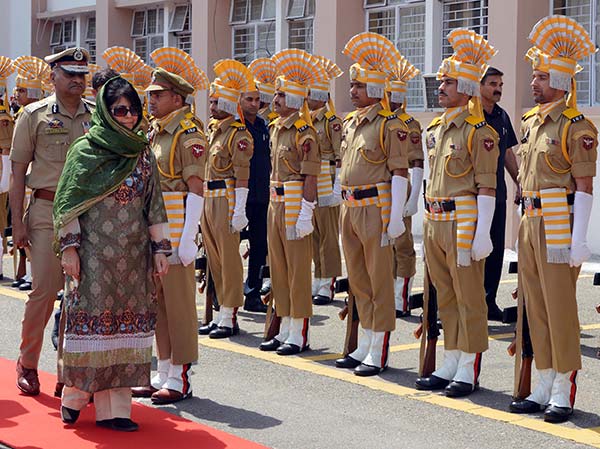Tasavur Mushtaq

Blazing sirens at 12 noon on April 4, finally announced the arrival of Mehbooba Mufti to the seat of power, the civil secretariat. Dressed in trademark green designer suit, headscarf and dark sunglasses, a choice that instantly went popular in the young female workers in the secretariat; she took the ceremonial salute at the guard of honour from a young lady police officer, a rarity on such occasions.
Accompanied by babus and a few ministers, her steps slowed down once she entered the corridor leading to her chamber, the office of Chief Minister. The corridor has wall-mounted photographs of the former 12 chief ministers. That included Mufti Sayeed, her father and political guru, whom she succeeded.
Her slow-motion entry into her office was suggestive of the loss she mourned for a quarter. At Fairview, she had changed the chair that Mufti would use, out of respect. But in the secretariat, she had to use the same chair, the throne of J&K.
In office for less than a week, it is too early to say how Kashmir’s first female ruler will govern the state. While her detractors say she lacks any experience in governance, Muzaffar Hussain Beig has defended her saying all American presidents have been first-timers. She is yet to appoint her personal staff.
An expectation is that she will make her minister’s work, make administration responsive. She has already sent a strong message that she will not tolerate corruption. She intends to use IT to enforced transparency and may introduce file tracking system on the pattern of central government to accelerate the processes and governance output.
People, she told her ministers in her first 30-minute meeting, had no choice earlier (when it was NC alone dominating the political landscape). “But now there are alternatives,” she said, “People have expectations. They will neither forgive us (for not delivering) nor give us a second chance.”
In her interaction with the administrative secretaries, Ms Mufti seemed chasing the first tenure of her father in 2002. The second 312-day tenure with BJP rarely finds a mention. But the fact, as one commissioner rank officer pointed out, is that her government will be decided in comparison to 88-days plus governance that governor N N Vohra gave to the state. “Mufti 2.0 had set Mufti 1.0 as its benchmark and it was a failure,” the officer, talking anonymously, said.
“He (governor) did not allow us to even sit, not to speak of sleeping,” admitted another officer. “So now the issue is can the new government with more people and the same set of human resource improve this recent record on governance?”
The ‘unpopular alliance’ has critical challenges. In its earlier stint, the alliance had become a “U-turn Sarkar” as Omar Abdullah termed it. They would take decision and after encountering pressures from its ally would roll back the same. This happened with the release of Masarat Aalam, and the executive order on the state flag. In fact, Mufti had started his inning by thanking Pakistan and militants, an issue that rocked parliament and triggered lot of heat and dust.
Ms Mufti skipped the ceremonial press meet after taking over. She has refused to get gung-ho over her priorities and, most importantly, kept calm over what she got after staying away for power for three months. This is despite Omar making it an issue that she must come out with details of what she got after delaying her takeover by three months. Apparently, she wants to avoid loud thinking and make her ally comfortable. But that she will be doing at the cost of her political constituency in Kashmir.
The capital city of Srinagar where her party had made inroads for the first time by taking five of the eight seats will prove a major challenge. Her father’s last activity of life was his Srinagar tour and the party may not be able to build on that because it has sacked two of the three ministers from the city. An unrepresented Srinagar will help the opposition to manage status quo ante.
This is a fact that her delayed takeover had raised expectations, paving way for questions now being raised everywhere. But her vote bank will judge her only on two counts.
Firstly, how she manages her restive ally that is so keen to see its footprints in policy and politics of Kashmir. The party with the sole plank of neutralizing the exclusivity that J&K retains in the federal set-up has already been working on various fronts. The recent is the NIT Srinagar which is literally under HRD control from Delhi. Her state’s police have already been replaced by the CRPF.
Secondly, how she tackles the human rights manages the existing legal infrastructure that protects the violators. PDP, as is well known, emerged merely in reaction to the violations of human rights. The issues regarding justice and rehabilitation of the victims of human rights violations, the AFSPA, and reduction of footprints of the counter-militancy setup would be core areas that would become barometers to judger her.
Developmental activities have been taking place in all regimes but what can distinguish her era would be something exceptional: can she get J&K one NHPC project? Can her regime build a couple of power stations in state sector that were abandoned for one or the other reason?

